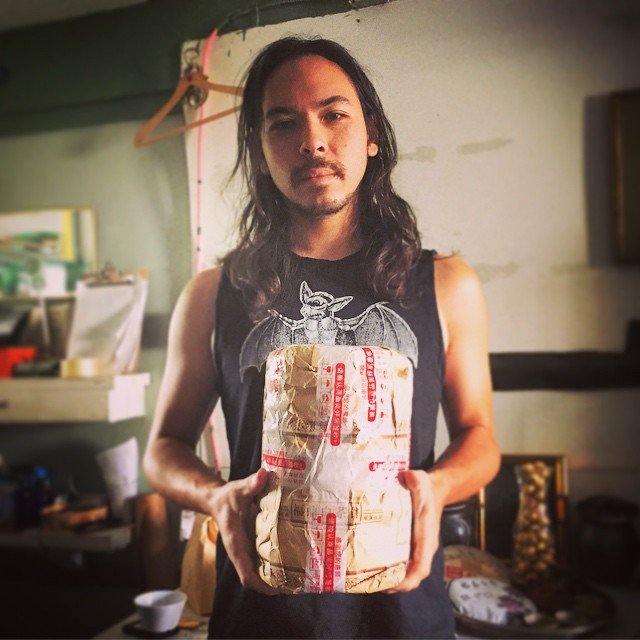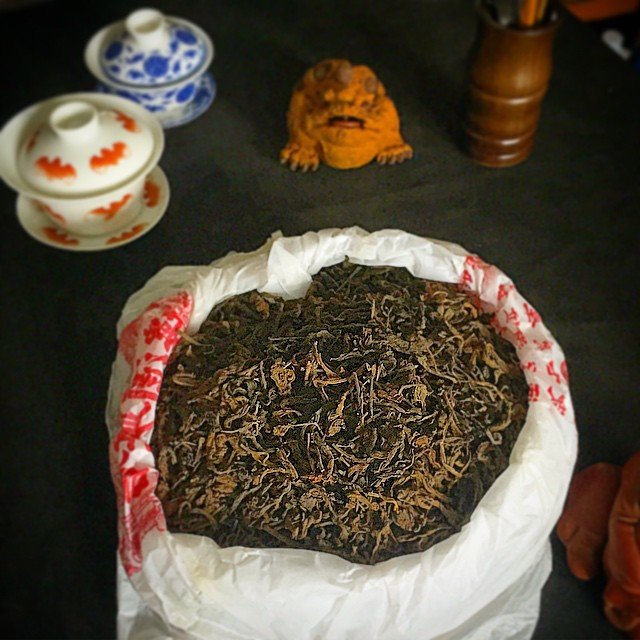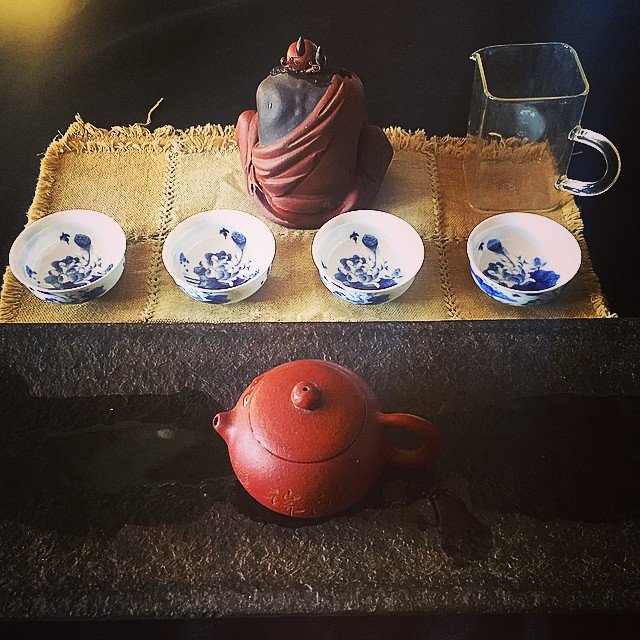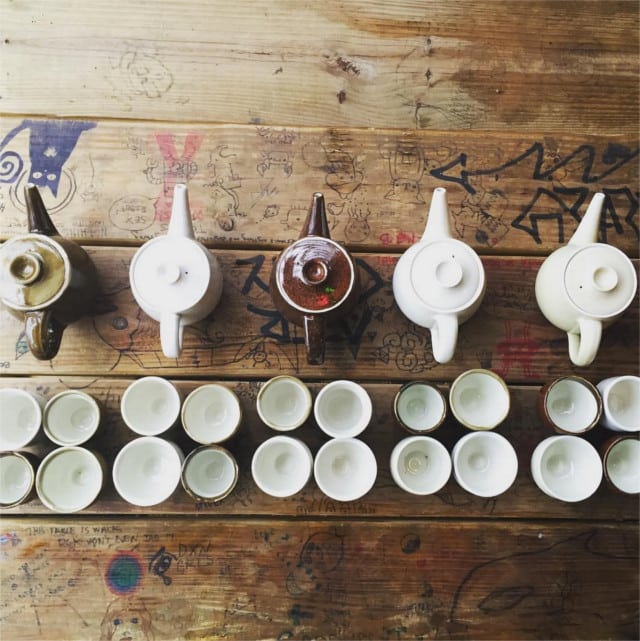
So Han Fan, owner of The Tea Spot in Austin
Guest article by Dana Sayre
The Tea Spot is nestled between The Vegan Yacht and Love Balls behind the Spider House Cafe courtyard in Central Austin. Inside an intimate shack, owner So Han Fan sells Chinese tea and performs gong fu cha style tea tastings for interested Austinites.
Accidental Tea Importer
“I got started by accident,” Fan said in an interview. “I got into tea when I was in college living in Santa Cruz, CA. I kind of was into it on my own for years and years.” After working for a tea house in Austin, Fan visited China to do some environmental research. “When I moved to China I was in tea land, so I was stoked,” he remembered. “I would go to visit tea farms on the weekends and I made relationships with a few farmers.”
Fan returned to Austin, and when he ran out of the tea he had brought back with him, he thought, “I’m not going to buy tea in America anymore. I have friends in China. I will buy tea from them.” Only, Fan’s tea shipment was returned to China instead. “It turns out you can’t just do that,” he explained. “You can’t just ship tea from China to America. There are all kinds of FDA clearances and customs stuff. Basically, you have to be an import company…Where it is legal, affordable and it works, it doesn’t get sent back.”
Wholesale to Brick and Mortar

Pu-erh tea from Hong Kong
“By the time I was done with all that, I was a company–I had a company,” Fan continued. “And I just kind of said,’Okay, I will do this now.’” Fan founded the West China Tea Company roughly two and a half years ago while working as a medical researcher. He started by selling tea at the farmers’ market and hosting events.
“Originally, wholesale was the main thing,” Fan said. “Juiceland was our first big account. They sell our tea in their stores. They put it as part of the juice cleanse. Pu-erh is good for cleansing and weight loss, detoxing, and things like that. Things that go along with juice culture.” Fan also sells tea to Dominican Joe and Mr. Natural, saying his focus is on only local businesses. “We don’t have any accounts with non-local businesses except a few local businesses in other places. We don’t work with anyone that is like a big chain. We’ve thought about Whole Foods and stuff,” Fan continued, “But I don’t think that would be a good place for my tea to be.”
The Tea Spot tea house opened in its current location in January 2015. “Originally, when I opened, the business model was that we would sell big pots and paper cups to people at Spider House,” Fan explained. “That is so time intensive. I had to pay someone to be here seven hours a day, seven days a week–sometimes more. It was good; people were buying tea. Just, the amount of tea you have to sell to make money doing that after paying payroll is so much.”
“I wanted to invest money into marketing,” Fan shared, saying he decided, “I will keep the tea house open, but I will just do tastings. If people are going to come to them, they might as well pay for them. That way, when people come, I know I am making money for sure. I didn’t know how much retail tea people were going to end up buying.”
“Initially, we did it to save money, but we ended up making more money,” Fan explained. “This is how tea is actually supposed to be presented: in a quiet, intimate way where you are really focused on what you’re doing and the taste of the tea. People who get a pot of tea at Spider House and go drink it, maybe it is the best tea they ever had, but they didn’t really interact with it in the same depth. They didn’t get any information about it. It’s not very clear how they can make this a part of their life and what they do.”
Exposing Austin to Chinese Tea Culture

Gong fu cha tea tasting
Now, in addition to selling tea, Fan is interested in expanding knowledge of Chinese tea culture here in Austin. “There’s a lot of different aspects of tea that make it interesting or make people get into it,” Fan said. A lot of people approach it from different angles. The main thing for people in Austin is that tea is like beer and chocolate and coffee and cheese and wine, and all these other gourmet things that people get nerdy about and develop a strong interest in and learn all about. And it’s because of all the different flavors and fragrances, and also the way it makes you feel, and this culture behind it.”
“Just opening your mind to the idea that tea isn’t just a kind of diluted watery beverage that you drink when you’re sick or when you don’t want to drink coffee or alcohol,” Fan continued. “We haven’t had access to good tea [in America] until just now, until very recently. What we do is bring over the most artisan, the most small production, the most farm direct, the most specialty, rare and unusual tea we can possibly find,” Fan explained. “There’s an elaborate culture of connoisseurship associated with tea. That’s something that people would not have had access to because it requires someone who knows about it to do it. But now we have access to it. We are bringing tea culture to Austin.”
“It’s hard to explain exactly what it is,” Fan admitted when I asked him to describe tea culture. “But it’s fun and it’s a form of internal cultivation. It’s meditative and it’s good for you. It’s fascinating. It’s a way to hang out with people without drinking alcohol. It’s social; it’s a pastime that involves consuming something that’s not just neutral. It’s not just, ‘Well, it’s not that bad for me.’ Tea is actually good for you. It makes you live longer. It makes you healthier.”
“I historically have downplayed the epicness of tea,” Fan continued. “It is already so epic that it can easily get overblown. This is something I have observed in California. They have a really mature tea culture, but there is definitely a lot of elitism sometimes. Romanticization or over-dramatization of tea and tea culture. Tea is awesome and amazing,” Fan said. “It does that on its own. We don’t need to emphasize the theatrics and spiritual elements of tea for people to experience those. I want to wait until someone tells me they are feeling the tea and asks me about it,” Fan said. “And then I will talk to them about what that is and what that means and what it has to do with gong fu cha.”
“It’s a part of Austin culture,” Fan said with satisfaction. “People are aware and know that Austin’s a place where you go to drink tea.”
Your Tea Experience
If you would like to purchase Chinese tea, you can find Fan on Sundays at HOPE Farmers Market in East Austin. As an alternative, Imagine Tea Leaf is a new tea truck in Austin which sells tea from local companies, as well as kombucha made by a company in San Antonio with tea purchased from Fan.
Fan hopes to collaborate even more with local companies like Sesa Pure and The Steeping Room. The Tea Spot hosts gong fu cha style tea tastings each Friday, Saturday and Sunday, with some weekday tastings mixed in. For more information and a complete listing of events, visit the website or follow The Tea Spot on Facebook.
@theAustinot wants to know:
Have you visited The Tea Spot? If so, what was your experience?
Dana Sayre is a freelance writer and Austinite. More of her writing, focused on issues of gender, sexuality, mental health and social justice, can be found on her website.


Leave a Reply